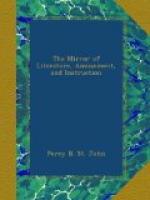Tartini and Lolly, had attained to the great mastery
which they possessed over their instrument during a
period of solitude—the one within the walls
of a cloister, the other in the privacy and retirement
of a remote country village. At all events, the
rumours were universally circulated and believed, and
the innocent and much injured Paganini had for many
years unconsciously stood forth in the eyes of the
world as a violator of the laws, and even a convicted
murderer—not improbably, to a certain extent,
reaping the golden fruits of that “bad eminence;”
for public performers, as we too often see, who have
once lost their “good name,” so far from
finding themselves, in the words of Iago, “poor
indeed,” generally discover that they have only
become objects of greater interest and attraction.
How long he had lived in the enjoyment of this supposed
infamy, and all the benefits accruing from it, we
really cannot pretend to say; but he seems never to
have been made fully aware of the formidable position
in which he stood until he had reached Vienna, when
the Theatrical Gazette, in reviewing his first concert,
dropped some pretty broad hints as to the rumoured
misdeeds of his early life. Whereupon he resolved
at once publicly to proclaim his innocence, and to
put down the calumny; for which purpose, on the 10th
of April, 1828, there was inserted in the leading Vienna
journals a manifesto, in Italian as well as German,
subscribed by him, declaring that all these widely-circulated
rumours were false; that at no time, and under no
government whatever, had he ever offended against
the laws, or been put under coercion; and that he had
always demeaned himself as became a peaceable and
inoffensive member of society; for the truth of which
he referred to the magistracies of the different states
under whose protection he had till then lived in the
public exercise of his profession.
The truth of this appeal (which it is obvious no delinquent
would have dared to make) was never called in question,
no one ever ventured to take up the gauntlet which
Paganini had thrown down, and his character as a man
thenceforward stood free from suspicion.
His whimsicalities, his love of fun, and many other
points of his character, are sometimes curiously exemplified
in his fantasias. He imitates in perfection the
whistling and chirrupping of birds, the tinkling and
tolling of bells, and almost every variety of tone
which admits of being produced; and in his performance
of Le Streghe (The Witches) a favourite interlude
of his, where the tremulous voices of the old women
are given with a truly singular and laughable effect,
his vis comica finds peculiar scope.
His command of the back-string of the instrument has
always been an especial theme of wonder and admiration,
and, in the opinion of some, could only be accounted
for by resorting to the theory of the dungeon, and
the supposition that his other strings being worn out,
and not having it in his power to supply their places,
he had been forced from necessity to take refuge in
the string in question; a notion very like that of
a person who would assert, that for an opera dancer
to learn to stand on one leg, the true way would be—to
have only one leg to stand upon. We shall give
Paganini’s explanation of this mystery in his
own words:




